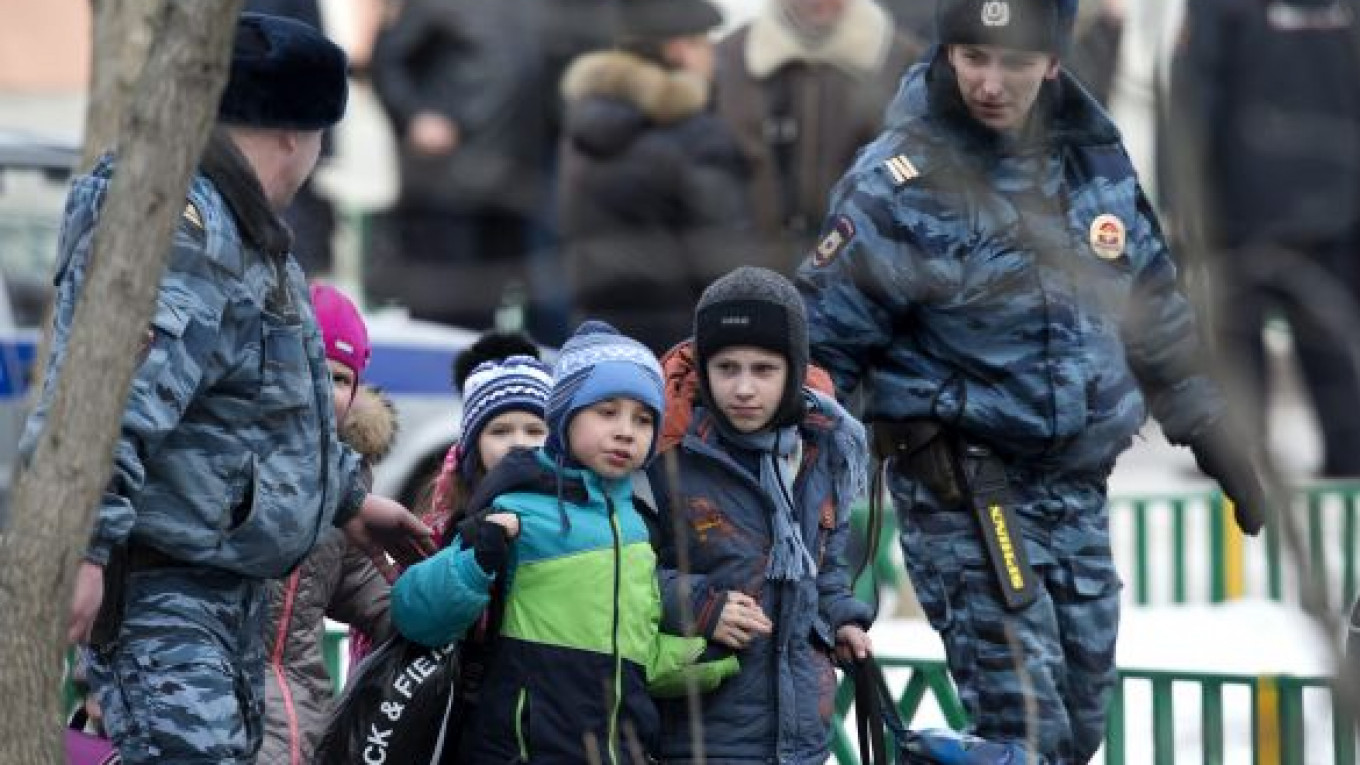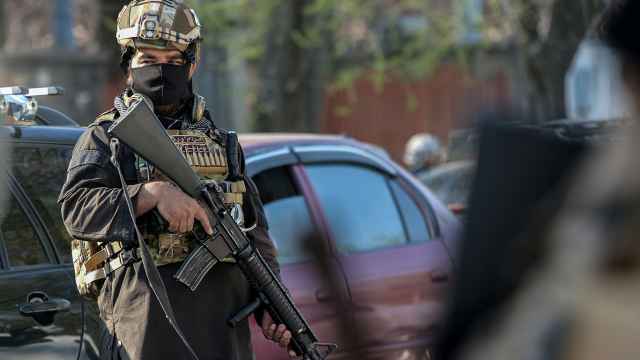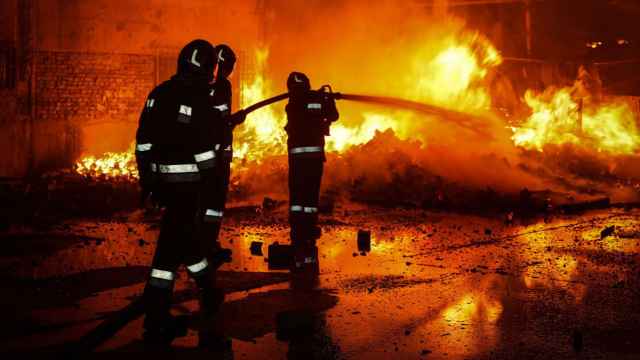A 10th-grade student killed a geography teacher and a police officer and took children hostage at a Moscow school on Monday in Russia's first-ever school shooting, triggering a debate on security at educational institutions and over the right to bear arms.
The incident was widely compared to school shootings in the U.S., with some commentators citing them as an argument for gun control and others saying that most of such killings took place in gun-free zones and therefore prove that restrictions on gun ownership should be relaxed.
The incident was also likened to several recent mass killings carried out by lone male shooters in Russia. These include one in Moscow's Bibirevo district in 2011, in which three people died, and the shooting in Belgorod last year, in which six people were killed.
School security was tightened nationwide after the Beslan hostage crisis in 2004, but the circumstances in that case were much different. Islamic militants seized a school in the town of Beslan in the North Ossetia republic, leading to a siege by Russian security forces, as a result of which more than 330 people were killed, 186 of them children.
In Monday's incident, the shooter, Sergei Gordeyev, killed two people and injured a police officer at School No. 263 in the Otradnoye district in Moscow's northeast, police said. News reports first appeared regarding the incident at about 12:30 p.m., when Life News reported that a man carrying two rifles had taken about 20 10th-grade students hostage and that a security guard at the school had managed to call the police.
About 30 minutes later, it was reported that two people had been shot, all the hostages had been released and the shooter detained. Police later said that a criminal case was opened on charges of hostage-taking, murder and attempted murder. As a minor, Gordeyev faces up to 10 years in prison if found guilty of the charges.
Preliminary reports indicated that the shooting could have been caused by a conflict at the school and may have been a revenge attack on the geography teacher, an unidentified law enforcement official told Interfax.
“According to our data, Sergei Gordeyev was a straight-A student, and likely had a nervous breakdown,” said Investigative Committee spokesman Vladimir Markin, who came to the school after the shooting.
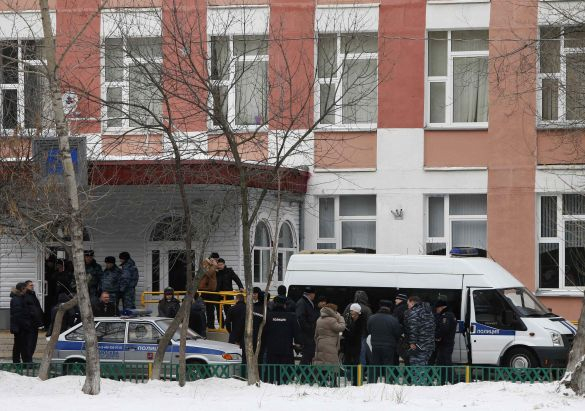
Security officers and other officials gathering outside of School No. 263.
Little information was immediately available about Gordeyev. A page on social network Vkontakte that supposedly belonged to him had virtually no details on it, and the police did not even reveal his age. Given his grade in school, he was thought to be about 15 years old.
Commenting on the incident, President Vladimir Putin, who was chairing a meeting on the arts in Pskov, said one of the reasons for it was likely a lack of proper upbringing in the modern age.
“We should raise a new generation of spectators with good aesthetic taste who understand and value the theater, drama and music,” Putin said. “If this were done in a proper way, today's tragedy in Moscow might not have happened.”
Education and Science Minister Dmitry Livanov also reacted to the event, saying it underscored the need for new measures to tighten security at schools. Moscow Mayor Sergei Sobyanin echoed Livanov's proposal, announcing that a complete “revision” of security measures at schools would be carried out.
The scene outside School No. 263 was solemn on Monday afternoon, with curious bystanders from surrounding apartment blocks patrolling the adjacent sidewalks, mingling with reporters and former students. Few people spoke.
Security personnel could be seen combing the classrooms on the first floor, while two men with metal detectors swept the driveway in front of the school's main entrance. Police officers escorted students and members of the school's faculty out the front gate and past a cordon of reporters in 10-minute intervals. They walked together, arms linked, many of them crying.
An emergency responder who had been inside the school declined to describe it. "I am not comfortable discussing it. It is complicated," he said, before retreating into the crowd.
Many former students of the teacher who was killed, Andrei Kirillov, approached the school to pay their respects. Nikita Shugayev, who graduated from the school three years ago, said he “knew the teacher very well” and that he was “a great guy.” His peers, apparently equally bewildered at what had happened, echoed the sentiment.
Most of the students who currently attend the school were sent home immediately after the shooting, though a few lingered at the scene. Olga Andronichenko, one of Gordeyev's classmates, stood in front of reporters and attempted to shed light on the day's events.
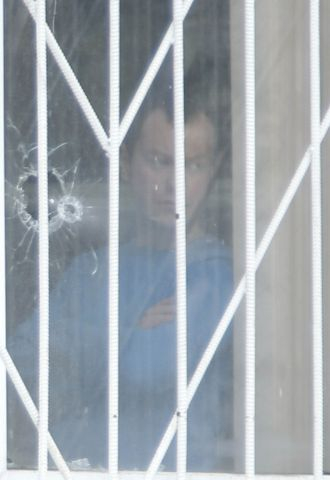
A man standing near a window with holes presumably caused by bullets.
She showed reporters photos from Gordeyev's Vkontakte page that were taken at last year's New Year party. “Basically he was a normal kid,” she said. “I don't know what happened in his head. He was a normal person.”
While gun control advocates have attributed school shootings to laws allowing arms possession, gun rights activists have argued that if people were permitted to carry guns on school grounds they would be able to shoot would-be criminals.
Irina Yarovaya, head of the State Duma's Security and Anti-Corruption Committee, reacted to the shooting by proposing tighter controls on gun possession, RIA Novosti reported.
The reaction of the authorities, who are accused by the opposition of rubber-stamping repressive laws in response to all major events, was derided by some critics.
“Urgent! A bill banning high school students has been submitted to the State Duma,” Yekaterinburg-based political analyst and blogger Fyodor Krasheninnikov quipped on Twitter.
Maria Butina, head of the Right to Bear Arms group, also disagreed with Yarovaya's proposal.
She said by phone that the student could not legally possess the rifles because he was underage. He is likely to have taken them from his father, who could have owned them legally, she said.
In the U.S., school shootings have taken place mostly in gun-free zones, and currently the number of such zones is decreasing, she said, adding that in Russia most schools were de facto gun-free zones.
“The shooting must become an additional argument in favor of extending the right to bear arms,” she said.
Anton Gusev, a lawyer at Goltsblat BLP, said by phone that there were no laws banning security guards or teachers from carrying guns on school grounds.
But there is legislation banning security guards from using weapons for purposes other than self-defense, he said. Moreover, it is very hard to prove that a certain action was taken in self-defense under Russian law, and courts often rule against defendants who use the self-defense argument, Gusev said.
Contact the authors at sukhov@imedia.ru and m.bodner@imedia.ru
A Message from The Moscow Times:
Dear readers,
We are facing unprecedented challenges. Russia's Prosecutor General's Office has designated The Moscow Times as an "undesirable" organization, criminalizing our work and putting our staff at risk of prosecution. This follows our earlier unjust labeling as a "foreign agent."
These actions are direct attempts to silence independent journalism in Russia. The authorities claim our work "discredits the decisions of the Russian leadership." We see things differently: we strive to provide accurate, unbiased reporting on Russia.
We, the journalists of The Moscow Times, refuse to be silenced. But to continue our work, we need your help.
Your support, no matter how small, makes a world of difference. If you can, please support us monthly starting from just $2. It's quick to set up, and every contribution makes a significant impact.
By supporting The Moscow Times, you're defending open, independent journalism in the face of repression. Thank you for standing with us.
Remind me later.


